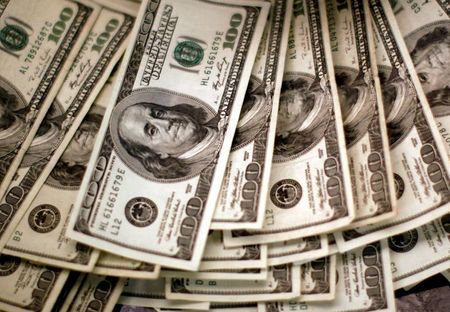By Saqib Iqbal Ahmed and Saikat Chatterjee
NEW YORK (Reuters) – The U.S. dollar advanced on Thursday, recovering much of the ground lost in the prior session after the head of the Federal Reserve told Congress he saw no need to rush the shift towards tighter post-pandemic monetary policy.
The dollar index, which measures the greenback against a basket of six currencies, was 0.2% higher at 92.603. The index fell as low as 92.272 earlier in the session.
The index has climbed in recent weeks as investors get more sanguine about the outlook for the greenback, driven by an increasingly upbeat assessment of the U.S. economy by the Federal Reserve, which has brought forward the time frame on when it will next raise rates.
On Wednesday, Fed chair Jerome Powell said https://www.reuters.com/business/finance/higher-inflation-virus-risks-follow-feds-powell-congress-2021-07-14 he is confident recent price hikes are associated with the country’s post-pandemic reopening and will fade, and that the Fed should stay focused on getting as many people back to work as possible.
“There are, of course, differing voices on the FOMC but the Chairman’s position seems quite clear; the taper discussion and decision will not occur until late this year,” Shaun Osborne, Chief FX Strategist at Scotiabank, said in a note.
Powell faced sharp questions https://www.reuters.com/business/finance/feds-powell-heads-senate-with-renomination-policy-inflation-backdrop-2021-07-15 about inflation and banking regulation in a hearing before the Senate Banking Committee on Thursday, issues likely at the forefront of his possible renomination to the top Fed post.
The greenback was helped Thursday by data https://www.reuters.com/article/us-usa-economy/u-s-weekly-jobless-claims-fall-as-expected-idUSKBN2EL1HD that showed the number of Americans filing new claims for unemployment benefits fell last week as the labor market steadily gains traction.
Sterling was about flat against the dollar after Bank of England policymaker Michael Saunders said the central bank could decide to halt its bond-buying programme early due to an unexpectedly sharp rise in inflation.
Weakness in oil prices and an ADP report that showed Canada lost 294,200 jobs in June, sent the Canadian dollar to a near 3-month low against the greenback.
(Reporting by Saqib Iqbal Ahmed and Saikat Chatterjee; Editing by Andrew Heavens and Alistair Bell)





